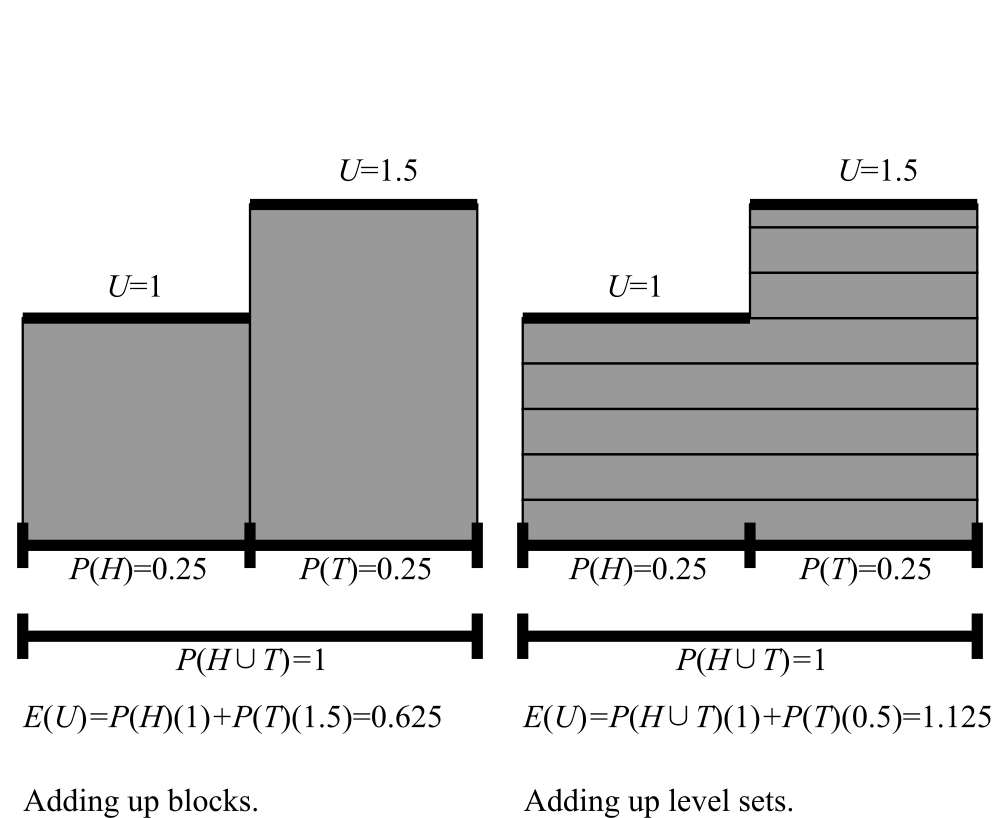Think of a wager as a sequence of event-payoff pairs:
- W = ((e1, u1),...,(en, un)).
There are then two different ways to calculate the expected value of the wager. First, directly:
- ED(W)=u1P(e1)+...+unP(en).
Second, indirectly by letting UW be the utility function defined by W, i.e., UW = u1 ⋅ 1e1 + ... + un ⋅ 1en (where 1e is the function that is 1 if e happens and 0 otherwise) and then calculating the expected utility of the function UW:
- EI(W)=E(UW).
If the credence function P is additive, then the two ways are equivalent. But without additivity, they come apart. Moreover, there is more than one way of calculating E(U) if the credences are inconsistent, but for now I will assume the standard Lebesgue sum way where, assuming U has only finitely many values, E(U)=∑yyP(U = y).
The most common de Finetti Dutch Book Theorem, which says that inconsistent probabilities give rise to a Dutch Book, makes use of the direct way of calculating the values of wagers. Specifically, it considers wagers where you pay an amount x for a chance to win amount y if event E eventuates, and it calculates the value of such a wager as yP(E)−x. However, if instead one uses the indirect method of calculation, the value of such a wager becomes (y − x)P(E)−xP(Ec), where Ec is the complement of E.
This actually makes a real difference to Dutch Book theorems. Consider this inconsistent credence for a coin toss:
P(H)=1/4
P(T)=1/4
P(H&T)=0
P(H ∨ T)=1.
Then for any credence function U, it turns out that EI(U)>0 if and only if the expected value of U is positive given the standard consistent fair-toss measure. The reason is this. Either U has the same value at heads and tails or it does not. If it has the same value at heads and tails, then EI(U) has the same value as the expectation using the fair measure, since P agrees with the fair measure regarding H ∨ T. On the other hand, if U has different values at heads and tails, then EI(U)=(1/4)U(H)+(1/4)U(T) which is exactly half of the fair measure’s expectation for U, and hence, again, EI(U)>0 if and only if the fair measure says the expectation is positive. It seems to follow that EI recommends exactly the same wagers as the standard consistent fair-toss measure.
Except that this isn’t quite true, either. For in addition to two ways of calculating expected values, there are two ways of making decisions on their basis in the case where a sequence of wagers is offered:
Accept a wager whose individual expected utility is positive.
Accept a wager when the expected utility of the already-accepted wagers combined with the currently offered wager exceeds the expected value of the combination of the already-accepted wagers.
Here, the combination of two wagers is concatenation. For instance ((e1, u1),(e2, u2)) combiness with ((e3, u3)) to form the wager ((e1, u1),(e2, u2),(e3, u3)). Given consistent credences, we have, E(W1 + W2)=E(W1)+E(W2), and (3) and (4) are equivalent. But, again, for inconsistent credences this additivity property can fail, and so a choice needs to be made between (3) and (4).
Note that (4) is itself an oversimplification. For theoretically, what wagers one accepts earlier on may depend on one’s best estimate as to what wagers will be offered later.
All in all, I know of five utility maximization decision procedures for sequences of wagers, generated by the answers to these questions:
Direct or indirect utility calculation for a wager? (D or I)
If indirect, Lebesgue sum or level set integral for calculating expectations? (LSum or LSet)
If indirect, is the presently offered wager combined with previously accepted wagers in calculating expectations? (Indiv or Combo)
For consistent probabilities, these are all equivalent.
Moreover, there are two kinds of Dutch Books. There are Simple Dutch Books, where from the original position the agent accepts a Dutch Book, and Incremental Dutch Books, where after accepting some wagers, the agent goes on to accept a Dutch Book.
What happens with Dutch Books varies between the different procedures, and I am still working out the details. Say that a credence P is monotonic provided that P(∅)=0, P(Ω)=1 and P(A)≤P(B) whenever A ⊆ B. Here is what I have:
D: Simple Dutch Books whenever probabilities are inconsistent.
I+LSum+Indiv: I conjecture Incremental Dutch Books for some but not all inconsistent monotonic credences.
I+LSum+Combo: I conjecture Incremental Dutch Books for all non-additive credences.
I+LSet+Indiv: I don’t know.
I+LSet+Combo: No Dutch Books of either sort for any monotonic credences.
